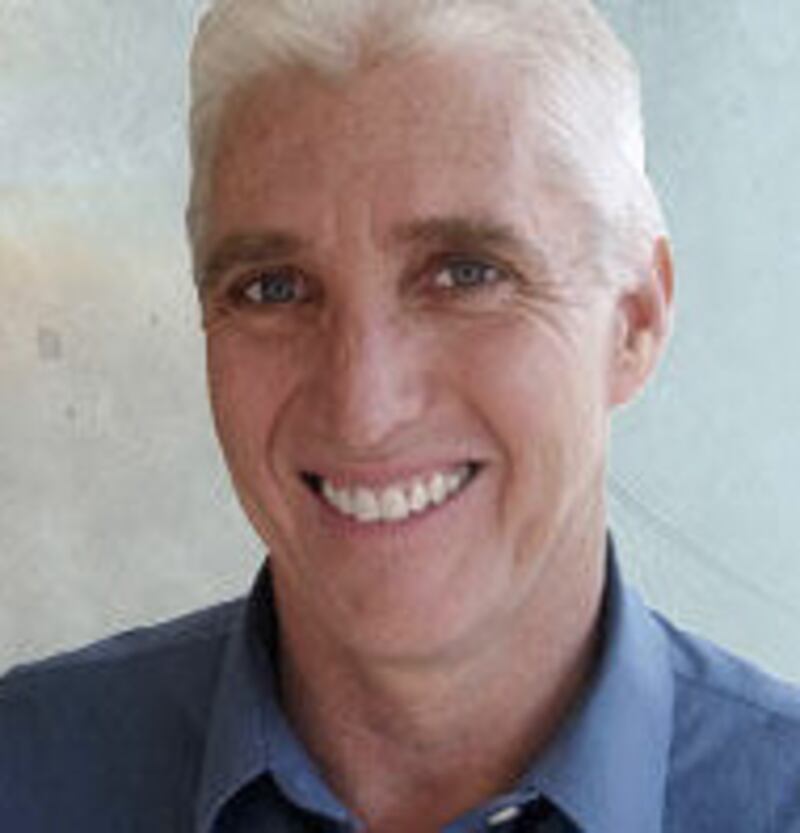
As an investigative reporter, John Dougherty broke key stories about John McCain’s days in the Keating Five. Now, he’s challenging McCain for his Senate seat. Samuel P. Jacobs reports.
Imagine if Bob Woodward had set aside his Watergate reporting and decided to battle Richard Nixon at the ballot box. That’s the dynamic unfolding now in Arizona, as one of the state’s best investigative journalists—who broke stories about Sen. John McCain’s involvement in the notorious Keating Five savings-and-loan scandal—has decided to challenge McCain for reelection this fall.
It’s a bootstraps effort, mounted with the aid of a campaign bus of 1978 vintage—christened the “Strayhound”—and a staff of 15 old friends camped out in a Phoenix bungalow previously rented by the Obama campaign. And it’s hardly a sure thing; the reporter, John Dougherty, has two weeks to muster enough signatures to get his name on the ballot—at which point he’d face four other Democrats vying for the chance to meet McCain in November, one of which is significantly better funded at this point than the newspaperman.
“He doesn’t suffer fools. Unfortunately, in Arizona, he’s surrounded by them,” said Michael Lacey, executive editor of Village Voice Media, which owns the New Times.
But McCain, fresh from his 2008 presidential defeat, is already in the toughest reelection fight he’s ever faced, confronted with a challenge from the right from Tea Party-infused ex-Rep. J.D. Hayworth. Accustomed to sailing through elections for most of the last 30 years in Arizona, McCain just saw a tough year get a little tougher with the addition of his old print nemesis—the ultimate opposition researcher—to the race.
Dougherty got his start in the news business as a gofer on The Washington Post sports desk in the 1970s. Since then, the 53-year-old has made a name for himself with his incisive reporting on Arizona officials and government malfeasance, notably his stories on former Gov. Fife Symington, who resigned from office following felony convictions for fraud (he was later acquitted and pardoned by President Clinton). After Dougherty began looking into Warren Jeffs, the polygamous religious leader found himself on the FBI’s Most Wanted list. Dougherty was twice nominated for a Pulitzer Prize by his editors at the Phoenix New Times, an alternative newsweekly.
“He doesn’t suffer fools. Unfortunately, in Arizona, he’s surrounded by them,” said Michael Lacey, executive editor of Village Voice Media, which owns the New Times.
It was Dougherty, working at the time for the Dayton Daily News, who broke the news that put the Keating Five scandal on the map. McCain, it turns out, aided political benefactor Charles Keating in his attempt to prevent the closure of his failing savings bank. McCain joined four other senators—all Democrats—in pressuring regulators to hold off on seizing Keating’s failing Lincoln Savings and Loan bank. McCain may not have been the worst offender, but it didn’t look good when he stepped in to defend a man whose bank was obviously in trouble and who just happened to have donated hundreds of thousands of dollars to the Arizona Republican’s campaigns. McCain’s family and Keating’s vacationed together in the Bahamas.
Dougherty investigated McCain’s political debt to his wife’s alcohol fortune in a 2000 piece, “ Haunted by Spirits.” And he covered McCain’s 2008 presidential bid for the Washington Independent, an online nonprofit news website.
Not all of his reporting irked the senator, Dougherty said. His coverage of the tough-talking Maricopa County Sheriff Joe Arpaio, no McCain favorite, elicited a complimentary phone call from the senator. (It also led to a grand jury investigation and the arrest of Dougherty’s bosses at the paper. Charges were dropped and they were quickly released.)
McCain “encouraged me to keep it up,” Dougherty says.
It’s unlikely that the McCain campaign will encourage Dougherty now. The Democratic upstart’s presence on the campaign trail will provide an unwanted reminder of McCain’s entanglement in the Keating affair. McCain was let off with a light rebuke from the Senate Ethics Committee in 1989, but the senator has called his involvement “my asterisk” and “a hell of a mess.”
These days, Dougherty calls McCain a “chameleon” who is “flopping all over the place” to make himself attractive to voters. Dougherty bangs the drum for solar power and inveighs against the state’s controversial new immigration law (“There’s a lot of fear that people could get picked up going to the Circle K at night and end up not coming home.”) He’s calling for greater personal responsibility when it comes to health care and stronger regulation of Wall Street.

Dougherty promises that he hasn’t put away his reporting notebook for good. “We will attempt to break news as we are going with this,” Dougherty says. And that, he argues, will help energize his campaign. “If we get to the general election, I think this race will capture the country’s imagination in the way that few candidates have. You will have the party’s standard-bearer and a consummate outsider. It will be one hell of a dogfight,” he says.
Could Dougherty—or any Democrat—win the Arizona Senate race? Probably not this fall, when forecasters predict a strong Republican showing nationwide. But it’s not impossible. The most obvious reason: Hayworth, McCain’s insurgent Republican challenger, who could upset the incumbent in the primary. In a state now evenly divided among Republicans, Democrats, and independents, Hayworth’s hard-right conservatism may not play well outside his party’s base.
Even if McCain does survive his primary, the Democrats still have a few things in their favor. For starters, the red state has shown it isn’t averse to electing Democrats; Janet Napolitano won the governorship in 2002. The job was left vacant when Napolitano was tapped by Obama to head the Homeland Security Department, and Republican Secretary of State Jan Brewer succeeded her. But Brewer’s signing of the state’s controversial new immigration law may scramble Arizona’s political order. While a majority of Arizona voters favor the recently passed legislation that requires those suspected of being illegal immigrations to show their papers, the law is firing up Democrats—and alienating conservative Latinos who may turn against the Republican Party.
And Democrats have a strong gubernatorial candidate, Attorney General Terry Goddard, poised to take advantage—and, potentially, lift the rest of the ticket. McCain’s in-state support in the 2008 presidential campaign wasn’t exactly resounding: Barack Obama took 45 percent of the vote. The anti-incumbent winds swirling across the country haven’t helped matters. Only 34 percent of respondents told Public Policy Polling at the end of April that they approve of the job McCain is doing in the Senate.
For now, the leading candidate in the Democratic field is Tucson Vice Mayor Rodney Glassman, who has said he’s got $500,000 socked away and has the most sophisticated organization in the field right now. But his victory is anything but assured.
“I don’t write off anybody’s chances right now,” says Jennifer Duffy, senior editor of the nonpartisan Cook Political Report.
One state Democratic official says none of the candidates have a lock on the Establishment’s support at this point. “Our party isn’t the old-school type of machine where you kiss the ring, and you’re blessed and you get to run,” the official says, adding, “It goes without saying that the Democratic Party appreciates Dougherty for exposing McCain’s failing over the years.”
As for Dougherty, he hints that the sagging fortunes of the media business may have helped push him into the race. “The decline of investigating reporting has played an interesting role in this,” Dougherty says. “There’s been no real platform for somebody like me. We need to have people who have experience holding institutions responsible within the institution itself.”
Samuel P. Jacobs is a staff reporter at The Daily Beast. He has also written for The Boston Globe, The New York Observer, and The New Republic Online.






